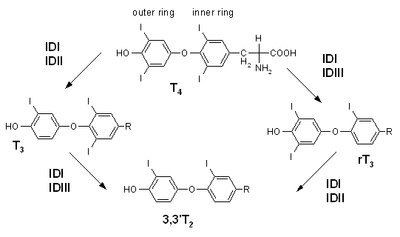
Reverse triiodothyronine
Encyclopedia
Reverse triiodothyronine (3,3',5'-Triiodothyronine, reverse T3, or rT3) is a molecule that is an isomer
of triiodothyronine
(T3). It is derived from thyroxine
(T4) through the action of deiodinase
.
rT3, unlike T3, does not stimulate thyroid hormone receptors. However, rT3 binds to these receptors, thereby blocking the action of T3. Under stress conditions, the adrenal glands produce excess amounts of cortisol
. Cortisol inhibits the conversion of T4 to T3, thus shunting T4 conversion from T3 towards rT3. As a consequence, there is a widespread shutdown in T3 binding across the body. This condition is termed Reverse T3 Dominance. It results in reduced body temperature, which slows the action of many enzymes, leading to a clinical syndrome, Multiple Enzyme Dysfunction, which produces the effects seen in hypothyroidism
. Effects include fatigue, headache, migraine, PMS, irritability, fluid retention, anxiety and panic.
rT3 increases in conditions such as sick euthyroid syndrome

Isomer
In chemistry, isomers are compounds with the same molecular formula but different structural formulas. Isomers do not necessarily share similar properties, unless they also have the same functional groups. There are many different classes of isomers, like stereoisomers, enantiomers, geometrical...
of triiodothyronine
Triiodothyronine
Triiodothyronine, C15H12I3NO4, also known as T3, is a thyroid hormone. It affects almost every physiological process in the body, including growth and development, metabolism, body temperature, and heart rate....
(T3). It is derived from thyroxine
Thyroxine
Thyroxine, or 3,5,3',5'-tetraiodothyronine , a form of thyroid hormones, is the major hormone secreted by the follicular cells of the thyroid gland.-Synthesis and regulation:...
(T4) through the action of deiodinase
Deiodinase
Iodothyronine deiodinases are a subfamily of deiodinase enzymes important in the activation and deactivation of thyroid hormones. Thyroxine , the precursor of 3,5,3’-triiodothyronine is transformed into T3 by deiodinase activity. T3, through binding a nuclear thyroid hormone receptor,...
.
rT3, unlike T3, does not stimulate thyroid hormone receptors. However, rT3 binds to these receptors, thereby blocking the action of T3. Under stress conditions, the adrenal glands produce excess amounts of cortisol
Cortisol
Cortisol is a steroid hormone, more specifically a glucocorticoid, produced by the adrenal gland. It is released in response to stress and a low level of blood glucocorticoids. Its primary functions are to increase blood sugar through gluconeogenesis; suppress the immune system; and aid in fat,...
. Cortisol inhibits the conversion of T4 to T3, thus shunting T4 conversion from T3 towards rT3. As a consequence, there is a widespread shutdown in T3 binding across the body. This condition is termed Reverse T3 Dominance. It results in reduced body temperature, which slows the action of many enzymes, leading to a clinical syndrome, Multiple Enzyme Dysfunction, which produces the effects seen in hypothyroidism
Hypothyroidism
Hypothyroidism is a condition in which the thyroid gland does not make enough thyroid hormone.Iodine deficiency is the most common cause of hypothyroidism worldwide but it can be caused by other causes such as several conditions of the thyroid gland or, less commonly, the pituitary gland or...
. Effects include fatigue, headache, migraine, PMS, irritability, fluid retention, anxiety and panic.
rT3 increases in conditions such as sick euthyroid syndrome
Reactions


